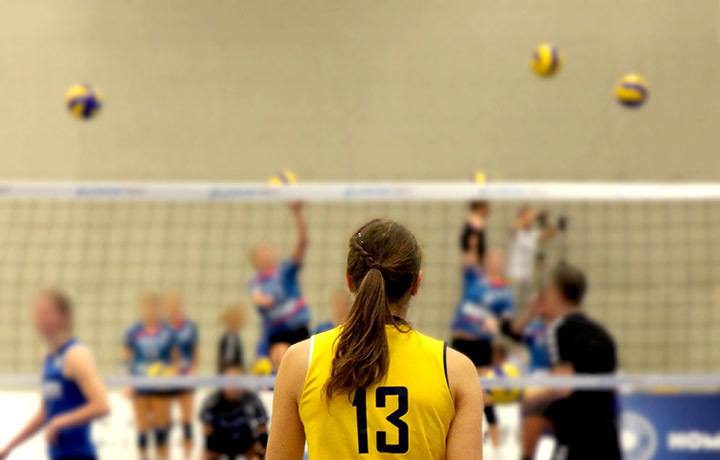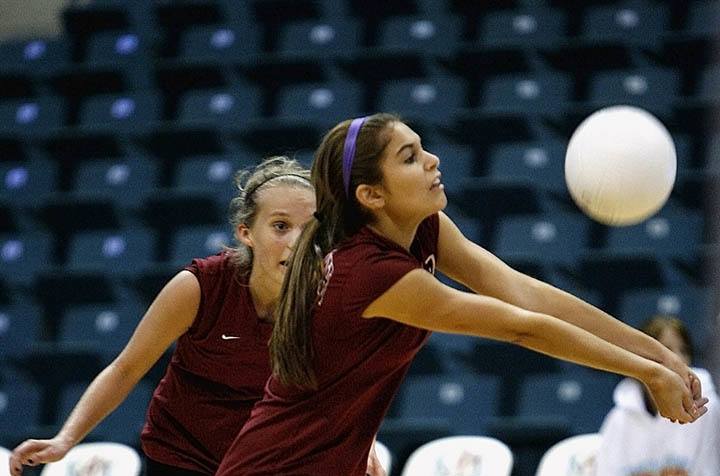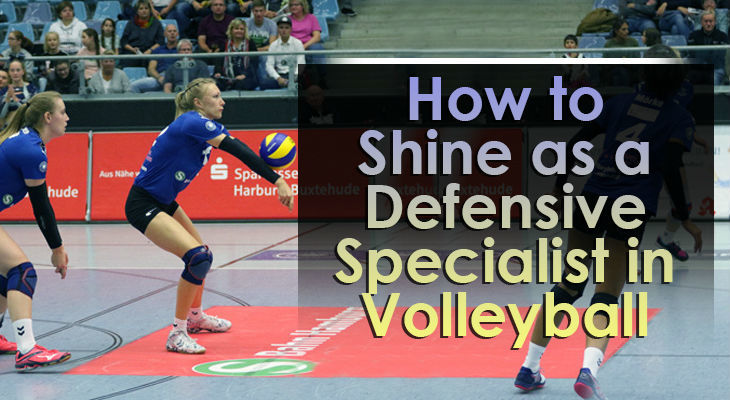How to Shine as a Defensive Specialist in Volleyball
The defensive specialist has long been valued as someone who can step in for a hitter that may be lacking in passing skill.
While defensive players may not rack up stats like assists, blocks, or kills…
They can be invaluable to a team by keeping rallies alive with high-quality back row passing.
Whether on serve receive or during play, defensive specialists are expected to be in position to provide the best pass to transition the team from defense to a good offensive set.
When implementing a defensive strategy, coaches need to be able to rely on strong back row players to fill in for lesser quality passers as they rotate to the back three spots.
Many defensive game plans rely on the blocker to cover the middle of the court while other defenders spread to the remaining gaps to pass.
Without defensive specialists, these strategies would be impossible to implement.
6 Traits of a Great Defensive Specialist
The defensive specialist is just that…
A specialist at the art of digging and passing the ball to help the team transition into a quality offensive set.
Some players are born with traits that make them an ideal defensive specialist, but many of these traits can be developed over time with practice and experience at the position.
1. Consistent
Some players are satisfied with simply getting a hard-hit ball in play.
The great defensive specialist takes it a step further...
While not all digs or receives can be perfect, the best defensive specialists are known to provide great passes at a high percentage.
2. Tenacious
As a defensive specialist, your role is simple…
Get the ball up and to the setter with a quality pass.
While the job does not require the aggression of a hitter or the vertical of a blocker, tenacity is absolutely a requirement.
Getting to balls that seem undiggable and hanging tough against hard hitters requires a mental toughness that is unique to defensive specialists.
3. Student of the Game
The defensive specialist should have the ability to strategize against a variety of offenses.
While the coaching staff will set the general defensive strategy, it is up to the defender to learn what the opponent is doing and where they are intending to go with the ball.
Someone with a strong ability to read the opponent makes a great defensive specialist.

4. Good Communicator
Communicating with net players provides insights to the front row about what the opponent defense is doing and where the weak spots are on the other side of the net.
Defensive specialists should have their eyes up and on the match in order to effectively communicate quality information to the front row.
5. Strong Server
As the defensive specialist typically substitutes for a weaker passer as they enter the back row, the defensive specialist is often called on to serve.
Great specialists perfect their service game to ensure they are not a “give-away” point when they enter the game.
6. Athletic
The defensive specialist could be called on to dive and get up multiple times during a rally.
It is vital that the specialist be one of the more athletic players on the team to facilitate the movements required of a back-row player.
Responsibilities of a Defensive Specialist
The defensive specialist usually enters the game to replace a weaker passer.
So obviously, they must be a strong passer!
The primary duty of the defensive specialist is to be perfect in serve receive, providing quality passes to the setter.
On defense, they’re required to know the defensive strategy and implement it perfectly.
They must know how to cover all angles and ensure they’re in the best position to dig attacks. The goal being to provide playable passes rather than settling for getting the ball “up”.
In addition, defensive specialists should be reliable, effective servers.
Since they’ll usually be entering the game as a poor passer rotates to the back row, this means they’ll be serving in the place of that player as well.
Unlike the libero, they’ll be frequently called upon to serve.
Which is why defensive specialist are expected to be both great servers and high level passers.

6 Tips for Defensive Specialists to Shine
The defensive specialist is relied on to be a great passer and good server.
Typically, athletic players are chosen for this position to facilitate the kinds of movements required of back-row defenders.
While naturally athletic, there is always room to grow as a defender.
Here are six tips to stand out as a defensive specialist for the right reasons:
1. Pass and Pass Again
If you enter a game and cannot provide perfect passes most of the time, your time as a defensive specialist may be short lived.
As we’ve seen, there are several jobs a defensive specialist is expected to do.
However, passing is the first and foremost skill a defensive specialist should perfect.
Set high expectations like being able to pass a driven ball into a basketball hoop or trash can at a high percentage.
This will ensure you’re ready to be relied on for your ball handling skills.
2. Serve and Serve Again
There is a sarcastic saying that goes, “You had one job!”
In the case of defensive specialists…
“You have two jobs!”
While passing is the first love of a specialist, serving should be the second.
As someone who subs in for a front row player, you will be called on to serve on a regular basis.
Being a great server distinguishes great defensive specialists from the average.
3. Pay Attention
It’s a unique challenge for a player to spend half the match on the bench yet be fully involved in the on-court gameplay.
Having the opportunity to watch the opposing setter and hitters from the sideline could prove to be a great advantage upon entering the court.
Pay attention so you can pass that information on to teammates and use it to your own advantage.
4. Hustle
Defensive specialists enter the game because of their athleticism and ability to get to hard balls.
Laziness is a quick way to not be substituted in on the next rotation.
Give everything you have to defending balls, even if they seem impossible to get to.
Defensive specialists cost coaches a substitution when they enter and leave, so prove that the cost was worth it by hustling to every ball.
5. Work on Your Quickness
The movements of a defensive specialist are unique, as most of the action is low to the ground.
Exercise with your position in mind, improving your side to side and small space speed.
The longer you can stay low and move in an athletic ready position, the easier your job will be on the court.
6. Read the Block
It can be tempting to head for a predetermined spot once the opponent set is in the air.
However, your position should be determined by where your blockers end up, not where the ball is set.
You may have to adjust your angle due to the way your block has been set up.
Do not fall into the habit of getting to a spot and simply hoping for the best.
Read the set, read your block, then decide your best position.
Conclusion
The defensive specialist is relied on for exceptional passing skills, great serving, and high-level defensive anticipation.
Unfortunately, due to substitution rules applying, a specialist gets limited opportunities to shine.
It’s important that the defensive specialist be prepared for the moment, having been involved in the match even from the bench.
A great defensive specialist will step in, play great defense, and get noticed for their ability to keep the ball alive and in play.

